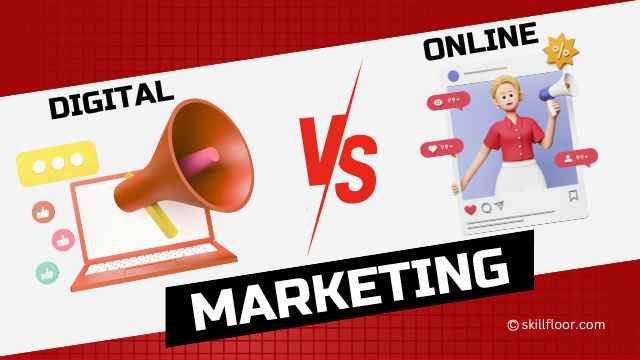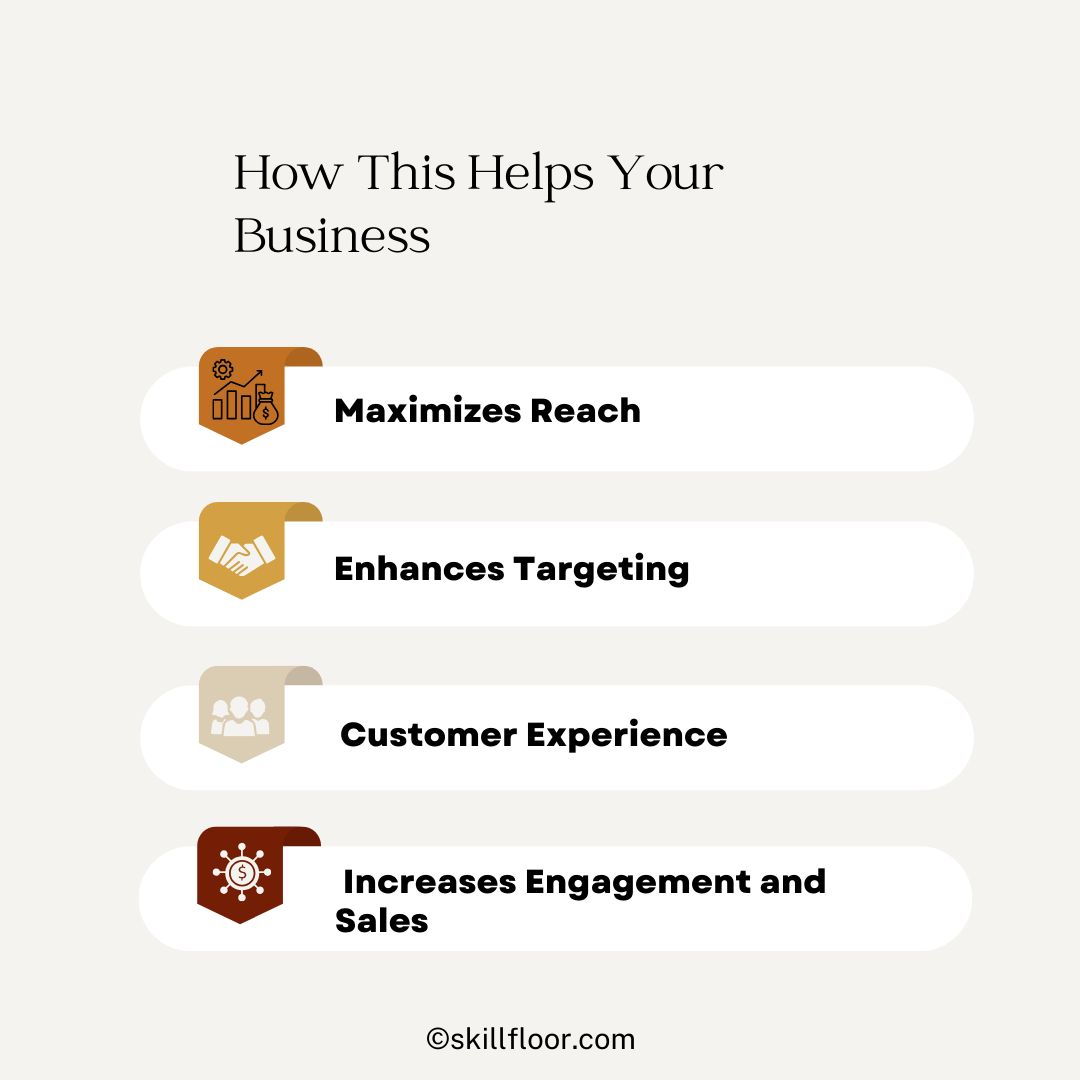Difference Between Digital Marketing and Online Marketing
The key differences between digital marketing and online marketing. Learn how to effectively use both strategies to maximize reach, engagement, and sales.

As a digital marketing expert, I’ve noticed that marketing has changed a lot in recent years. People often mix up the terms "digital marketing" and "online marketing." While they are similar, it’s important to know the differences.
Digital marketing is a broad term. It includes all kinds of marketing that use electronic devices. This can be things like social media, emails, mobile apps, websites, and more. If it involves any kind of electronic device, it’s part of digital marketing.
Online marketing is a specific part of digital marketing. It focuses only on marketing that happens on the internet. This includes online ads, ads on social media, email marketing, and search engine optimization (SEO).
Knowing the difference between digital marketing and online marketing helps me create better marketing plans. By using both strategies, I can help businesses reach more people and succeed.
What is Digital Marketing?
Digital marketing is a broad term that encompasses all marketing efforts that utilize electronic devices or digital technologies. This means it includes a wide variety of channels, both online and offline. Here are some key aspects to consider:
-
Multiple Channels: Digital marketing is not limited to the Internet. It also includes traditional digital media such as TV, radio, and digital billboards. This gives businesses many options to reach their audiences.
-
Integration of Strategies: Digital marketing blends online and offline channels to create a comprehensive marketing approach. This helps brands create a seamless experience for customers across different platforms.
-
Data Management: One of the crucial features of digital marketing is the ability to manage and analyze customer data from various sources. This allows businesses to understand customer preferences and behaviors, leading to more personalized marketing efforts.
What is Online Marketing?
Online marketing, on the other hand, refers specifically to marketing activities that occur on the Internet. This includes a range of tactics that leverage online platforms to connect with consumers. Key elements of online marketing include:
-
Websites: Creating and optimizing websites to attract visitors and provide information about products or services. A well-designed website is essential for online success.
-
Social Media: Using social media platforms such as Facebook, Instagram, and Twitter to engage with potential customers and share content. Social media allows businesses to build communities and interact directly with their audience.
-
Email Marketing: Sending targeted emails to customers and potential leads. This is an effective way to communicate directly with your audience and keep them informed about promotions or updates.
-
Search Engine Advertising: Paying for ads that appear on search engines when users search for specific keywords. This helps drive traffic to websites and increases visibility in search results.
Key Differences Between Digital Marketing and Online Marketing
1. Scope and Reach
-
Digital Marketing: Think of digital marketing as a large umbrella that covers all types of marketing using digital technology. It reaches people through various channels, whether online or offline. For example, you might see an ad on TV that encourages viewers to download a mobile app. This is a form of digital marketing that does not solely rely on the Internet.
-
Online Marketing: This term refers specifically to activities that happen on the internet. It includes things like social media posts, blog articles, and online ads. If you are reading a blog or clicking on a sponsored post, that’s an example of online marketing in action.
2. Examples of Each Approach
Digital Marketing:
-
TV Ads: Television commercials that promote products or services, often urging viewers to visit a website or download an app.
-
Radio Spots: Similar to TV, radio ads can reach specific audiences and promote events or services, such as local restaurants or promotions.
-
Digital Billboards: These billboards display ads using LED technology and can change content in real-time. They are placed in high-traffic areas to capture attention.
-
SMS Marketing: Sending text messages with promotions, updates, or reminders directly to customers' phones.
Online Marketing:
-
Search Engine Optimization (SEO): This involves optimizing your website and content to improve visibility in search engine results. The goal is to attract more organic traffic.
-
Content Marketing: Creating valuable content, such as blog posts or videos, to engage your audience and establish authority in your industry.
-
Social Media Advertising: Running targeted ads on platforms like Facebook and Instagram to promote products or services directly to users based on their interests.
3. Focus and Strategy
-
Digital Marketing: The focus here is on creating a complete customer experience by integrating various marketing channels. For example, a digital marketing campaign might start with a TV ad introducing a new product. This ad could encourage viewers to visit a website or follow the brand on social media. Afterward, the brand might send targeted emails to remind customers about the product and share user testimonials or reviews.
-
Online Marketing: This strategy is centered around maximizing your presence on the internet. It might involve a series of blog posts optimized for SEO, combined with a social media campaign that shares snippets of those posts. This approach helps drive traffic back to your website while engaging users through different online platforms.
How to Use Digital Marketing and Online Marketing Effectively
1. Choosing the Right Channels
-
For Digital Marketing:
Understand Your Audience: Identify where your target audience spends their time. Do they prefer watching TV or listening to the radio? If so, consider incorporating those channels into your marketing strategy.
Use a Mix of Channels: Combine online and offline marketing efforts. For example, if you run a radio ad, include your website link in the announcement to drive traffic to your online platforms.
-
For Online Marketing:
Leverage Data and Analytics: Use tools like Google Analytics to gain insights into your online audience. This data helps you understand who visits your website and what content they find most engaging.
Focus on SEO: Optimize your website and content to improve search engine rankings. Higher visibility in search results can lead to more organic traffic.
2. Creating an Integrated Strategy
-
Cross-Promotion: Promote your social media channels in your TV and radio ads. Mention your website in your social media posts to drive traffic and encourage followers to engage with your brand across multiple platforms.
-
Consistent Branding: Ensure that your branding, messaging, and visual elements are consistent across all channels. This creates a familiar experience for your audience and builds trust over time.
3. Managing Customer Data
Digital marketing allows you to collect and analyze data about your customers from various sources. By utilizing customer relationship management (CRM) systems, businesses can track interactions across both online and offline channels. This enables you to create more personalized marketing efforts, improving customer satisfaction and engagement.
How This Helps Your Business
1. Maximizes Reach
Using both digital and online marketing strategies expands your reach. You can connect with audiences who may not be active online through offline digital channels, such as TV or radio ads. At the same time, you can engage the vast online community through websites and social media platforms.
2. Enhances Targeting
Online marketing allows for precise targeting based on demographics, interests, and behaviors. By combining this with digital marketing strategies, you can craft messages that resonate more effectively with your audience. For instance, you can use data from social media platforms to inform your TV ad campaigns.

3. Improves Customer Experience
A well-rounded strategy ensures that customers encounter your brand across multiple touchpoints. Whether they see your ads on TV, hear about you on the radio, or read about you online, this reinforces brand recognition and trust. When customers have a consistent experience with your brand, they are more likely to engage and convert.
4. Increases Engagement and Sales
By leveraging both digital and online marketing, you can create a multi-touchpoint strategy that guides customers through the entire buying journey. This increases the likelihood that they will purchase your products or services. For example, a customer might see a TV ad, follow your social media, and finally receive a targeted email that prompts them to make a purchase.
Understanding the difference between digital marketing and online marketing is essential for anyone looking to succeed in today’s competitive market. Digital marketing is a broad term that includes all electronic marketing efforts, while online marketing focuses specifically on internet-based activities. By effectively utilizing both strategies, businesses can reach more people, engage better, and ultimately achieve their goals.
Whether you’re aiming to increase brand awareness, get traffic to your website, or boost sales, combining digital and online marketing approaches can help you stand out in a crowded marketplace. By understanding how each type of marketing works and how to implement them together, you can create a more powerful marketing strategy that effectively connects with your audience. This holistic approach will enable your business to thrive in the digital landscape, adapting to the changing preferences and behaviors of consumers.






























































